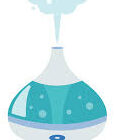How To Clean Portable Dehumidifier Coils in 3 Simple Steps
How Do I Clean the Coils on My Dehumidifier? You should know how to clean portable dehumidifier coils. We do not promise you will like the job, but someone has to do it. The good thing is that if you clean them regularly, it will become easier. Do not let the dirt accumulate on the … Read more




